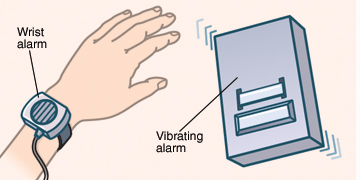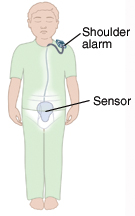Most kids outgrow bedwetting over time, which means patience is the best cure. The doctor may suggest ways to speed up the process. This includes the ideas outlined on this sheet.
The Self-Awakening Routine
To overcome bedwetting, your child must learn to wake up when it’s time to urinate. These tips will help:
- If your child wakes up for any reason, he or she should get out of bed and try to use the toilet.
- If your child wakes and the bed is wet, he or she should help change the sheets and wet pajamas before returning to bed.
- Each evening, have your child lie on the bed, pretending to sleep, and imagine he or she has to urinate. The child should get up, walk to the bathroom, and try to urinate. This helps teach the habit of getting out of bed to use the toilet.

Bedwetting Alarms
A specially designed alarm may help teach a child to wake up to urinate. These are available at drugstores, medical supply stores, and on the Internet. Here’s how they work:
- The alarm contains a sensor. It attaches either to the underwear or to a pad on the bed. A noisy alarm may be worn around the wrist or on the shoulder near the ear. Or, a vibrating alarm may be placed under the child’s pillow.
- If the child begins to urinate, the alarm goes off. This wakes the child up. He or
 she can then get up and use the toilet.
she can then get up and use the toilet. - Some children sleep through the alarm at first. You may need to wake your child when you hear the alarm.
Other Lifestyle Changes
- Limit all liquids in the evening. This may help keep the bladder empty during the night. (Don’t limit drinks altogether. This can cause dehydration. Instead, have your child drink more during the day and less in the evening.)
- Limit caffeinated drinks (such as colas and other sodas) at dinner. Caffeine stimulates urination. Also limit chocolate, which contains caffeine.
- Encourage your child to use the bathroom regularly during the day.
Medications
Medications come in nasal spray, pill, or liquid form. They may reduce the amount of urine the body makes overnight. They may also help the bladder hold more fluid. Medications can give your child extra help staying dry during vacations or overnight stays away from home. But keep in mind that medications don’t cure bedwetting, and they’re not a long-term solution. Also, medications can have side effects. Talk to the doctor about using them safely.
